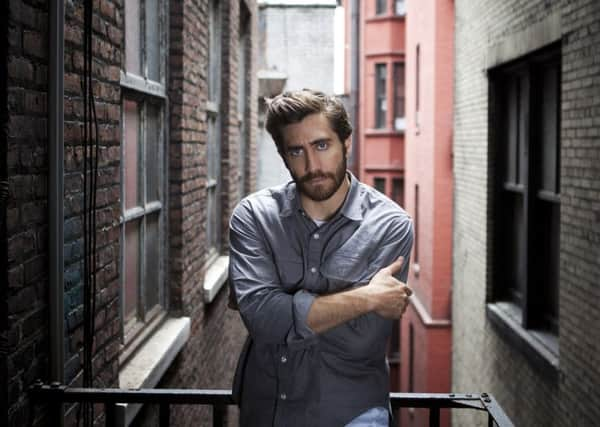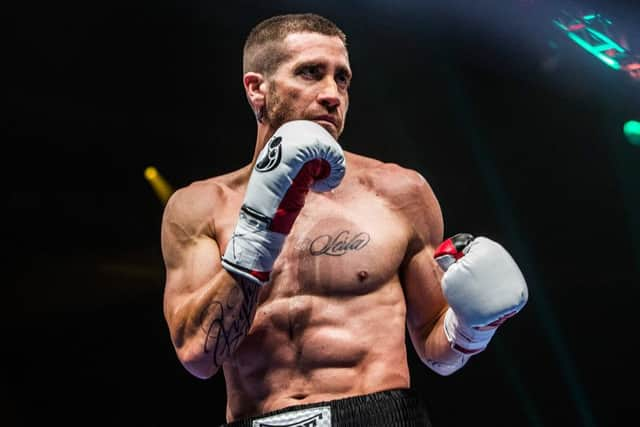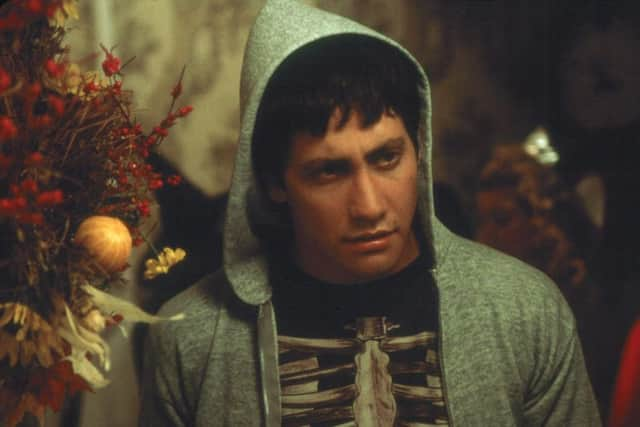Jake Gyllenhaal taps his inner angst with Southpaw


Jake Gyllenhaal is sitting in a floral patterned armchair in a London hotel room, throwing weak punches at an invisible opponent. His feeble jabs couldn’t be more different to the explosive body-shakers he unleashes as fictional boxer Billy Hope, in director Antoine Fuqua’s bruising tale of loss and redemption, Southpaw.
On screen, Gyllenhaal looks like he was born to fight. However, when Fuqua sent him to be assessed by Terry Claybon, who trained Denzel Washington for The Hurricane, Gyllenhaal had never boxed before, and Claybon wasn’t impressed by what he saw when he told the actor to shadow box.
Advertisement
Hide Ad“He let me do it for a while,” says Gyllenhaal, sitting on the edge of his chair and moving his clenched fists through the air in slow motion. “It was maybe a minute and a half, but it felt like an eternity, and then he went, ‘Oh, hell no!’”


Although Gyllenhaal was embarrassed, he’s not a quitter. When Sam Mendes was casting the lead role in the Gulf War drama Jarhead and doubted whether the young actor could become “enraged, violent and emotionally ugly” enough to play real-life US Marine Anthony Swofford, Gyllenhaal set out to convince him that he could. “His hesitation made me hesitate,” he told me a few years ago, “but I felt like I had it in me. Yet proving it to him was a hard thing, and it took a while.” He now finds such challenges appealing, and admits to enjoying the opportunity to prove people wrong, and test himself in the process.
“I think what I’ve realised recently is that, culturally, it’s become much easier to destroy than to create,” he says. “And somehow, in me, I have this resistance to those who are easily willing to dismiss. And those who are easily dismissable are those you should be careful of, because in destroying the idea of something they believe in, they will come back even stronger.” Directors who haven’t completely believed in him have “only made me work twice as hard, four times as hard, sometimes ten times as hard,” he says.
Despite Claybon’s scepticism, Fuqua had faith in Gyllenhaal. Five years before Southpaw, the film-maker had told him, “I see something in you”. “I thought this was just some Hollywood crap he was throwing at me,” says Gyllenhaal, “like: ‘I see something in you other people don’t see in you, kid,’ and kind of dismissed that.” It turned out to be true, though. When they met again, Fuqua remembered their conversation and said, “I think you could really do this role.”
Billy Hope is a man whose anger has helped make him a champion inside the ring. Outside, though, it is a liability. And when his temper leads to a violent confrontation and a tragic death, Hope loses his title, money, and daughter. The film charts his bid to rebuild his life and regain his dignity and self-respect.


Gyllenhaal, who studied Tibetan Buddhism and eastern mysticism at Columbia University, before dropping out after two years to focus on acting, believes there are reasons “for things appearing in our lives when they do. I’m just not sure whether the arrow draws forth the target or vice versa.”
Advertisement
Hide AdWhatever the truth, when he played the eponymous mixed-up teenager in the cult favourite Donnie Darko, Gyllenhaal was a mixed-up teenager himself. Jarhead, meanwhile, arrived when its themes of violence and frustration resonated with his own “feelings of frustration, and wanting [to] punch my fist through a wall.”
Not unconnected, the role of Billy Hope “came to me at a time in my life where I was very curious – and I still am – about my own anger,” he says. “I’m very curious about what it is that sets me off, because sometimes it’s baffling to me.
Advertisement
Hide Ad“I would like to say it’s always injustice, but it’s not. It’s sometimes just in a car in traffic. I wonder what those feelings are, and I’m interested in them. This role gave me the opportunity to explore that idea in the safe space of a character.”
Gyllenhaal is pleasant company. I haven’t seen any reports of him flying into a Christian Bale-scale rage at work. And while directors and fellow actors do often talk about him being challenging and, occasionally, outspoken, it’s usually only ever because he wants to get the best out of himself, the material, and the people around him. So why all this talk of anger? Is he an angry person?
“I wouldn’t consider myself that,” he says. “But there have been times where I have reacted to things in my life where I think, ‘Well, that didn’t leave me feeling great.’ So then I wonder how I can stop, or not stop, how I can be more curious about that idea, before I end up going phut. Acting lets me stop and question those things that when you’re walking in reality, sometimes you’re not as aware of.”
Part of Billy Hope’s journey involves learning to control his rage. Gyllenhaal threw himself into the part, just as he has thrown himself into everything since learning about the advantages of totally immersing himself in the world of a character working on 2012’s gritty police drama, End of Watch. For that, he and co-star Michael Peña spent months driving around South Los Angeles with real cops, dodging bullets, looking at dead bodies, and generally soaking up the life of the men and women trying to keep the peace. By the end, it wasn’t just the technical and behavioural lessons he had learned that showed up on screen, he suggests, but the police officers they spent time with. “I can’t really explain how, and it sounds a bit absurd, but I believe we take with us the experience that we have, and I think the audience will see that.”
Authenticity is what he always strives for, and it is there in spades in Southpaw, where the blood and sweat all-but pour off the screen. To prepare, Gyllenhaal adopted the lifestyle of a boxer, doing two three-hour training sessions a day, seven days a week for four months.
He went to gyms to meet people in the fight game, got into the ring with pros, and when the cameras rolled, took real punches rather than use a double.
Advertisement
Hide AdPhysically, he looks every inch a fighter, and a world away from the creepy, sociopathic news cameraman he shed 30lbs to play in Nightcrawler. To get over that film, and before going into Southpaw, he did Everest, about an ill-fated climbing party, which took him to the Dolomites, to recalibrate. “I was up on a mountain, I was enjoying myself, and that was the point of it.”
He hasn’t always enjoyed himself. The films from End of Watch onwards mark a new phase, a kind of return to the more personal, less obviously commercial film-making with which he began his career, before he veered, temporarily, into blockbusters, with The Day After Tomorrow and Prince of Persia: Sands of Time. Films that I suggest look anomalous on his CV. He agrees.
Advertisement
Hide Ad“There was a period of time where I really just stopped listening to myself,” he says. “I was unclear about what I wanted to say, and how I wanted to even just live my life, and where I wanted to be.”
Now 34, he grew up in LA as the son of a film director, Stephen Gyllenhaal, and award-winning screenwriter Naomi Foner, and was younger brother, by three years, of a sister, Maggie, also a successful actor. As a child, he was surrounded by Hollywood notables such as Billy Crystal, Jamie Lee Curtis, and Martin Short. One day, Paul Newman took him driving on a race track.
If this sounds like a Hello!-style idyll, it’s not the way Gyllenhaal experienced it. He saw the ups and down his parents went through trying to get films made, while his mother has talked about the rows they had when they worked together. No childhood is perfect, and despite the glamorous gloss that it would be easy to coat it with, Gyllenhaal’s was no different in this regard.
“I think that no-one had a great childhood, no matter what they say,” he told me the first time we met. “Even though we all pretend we want to go back and be children again, I don’t think we would really want to. Being a child is very hard in this world, no matter how you were brought up.”
Gyllenhaal acknowledges that he grew up with privilege. But he also says that his mother, in particular, saw to it that he and Maggie weren’t raised inside a bubble cut off from reality.
For his bar mitzvah, for example, she took the family to feed the homeless at a shelter.
Advertisement
Hide Ad“That was her being very conscious of giving us a perspective, and ultimately I think it has really influenced me,” he says. “I think it’s really important. I think every child, no matter what, should have perspective wherever they’ve grown up or been brought up, and be free of judgment.”
Another important lesson he learned from his parents and that has increasingly informed his work is that art and films can be influential, and therefore should be taken seriously.
Advertisement
Hide AdBrokeback Mountain has proven the wisdom of this, he says. “People come up to me even now and say that they were terrified to come out, and then they came out to their parents after they saw the movie. That happens more often than I can tell you. I’m not saying it was the biggest influence but something in that movie pushed them – some piece of culture pushed them to that place – and I think that’s where there’s wonderful power.”
When Gyllenhaal’s parents made Losing Isaiah together, tensions between them brought their marriage, Foner has said, to “the brink”. They divorced some years later. In 2009, Gyllenhaal finally decided to leave LA and move to New York to be closer to his mother, who’d relocated there, and his sister, who’d been living there for some time with her husband, the actor Peter Sarsgaard, and their daughters, Ramona and Gloria Ray. The way he tells it makes it sound like he was experiencing a re-awakening, personally and professionally.
On the one hand, he was moving away from an environment he had known since childhood. On the other, he was moving towards something close to his heart.
Growing up, he had been surrounded by film people. Certainly movies were all his family knew. Moving from that to New York, “conceptually made me feel like I was moving towards the theatre,” he says, “which my family has nothing to do with. And that was really interesting because I love the theatre so much and it’s somewhere I really feel most comfortable.” (He recently made his musical debut as Seymour Krelborn in a New York production of Little Shop of Horrors.)
Call it growing up, or something else, but Gyllenhaal was going through a transition in his life and in his work that has led to one of the most exciting phases in his career to date. “I was starting to see everyone in my family as they really are,” he says, “and there was a real truth that was coming through from all of them, and it was really freeing.
“And I remembered this feeling that I had, and I have, particularly when I’m on stage, which is this great feeling of excitement... I realised I had displaced that somewhere, and I didn’t know where it was. But I remembered it. It was like a faint sound far away that I had to find again.”
Advertisement
Hide AdWhen he was younger, he’d sometimes choose films and characters because he felt they would give him a sense of family on set, even though he knew deep down that it was false.
“Now I don’t think I’m searching for that anymore,” he says, smiling. “I am so satisfied with all the amazing imperfections that my real family is, and feel real love for them, that I don’t need that.”
Advertisement
Hide AdHe mentions an interview he did, and which a journalist quoted back to him, in which he said that the new direction in his work was to do with waking up one day and finding himself, metaphorically, in “the wrong room”, because of the choices he had made.
Press junkets aren’t often occasions for epiphanies. But when he was asked what room he was in now, Gyllenhaal says he suddenly had a light-bulb moment.
“It’s kind of an amazing feeling because I said, and I think I believe this, ‘I don’t feel like I need a room anymore.’ And I think that’s sort of true.” He laughs and wags his finger at me. “Emphasis on the sort of.”
Whatever the reality, he is currently going through a purple patch, doing work that is exciting, complex, sometimes challenging, sometimes slightly baffling, but always worth your attention. And there aren’t many actors you can say that about.
• Southpaw is in cinemas from Friday 24 July